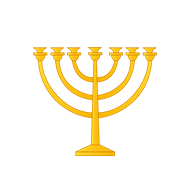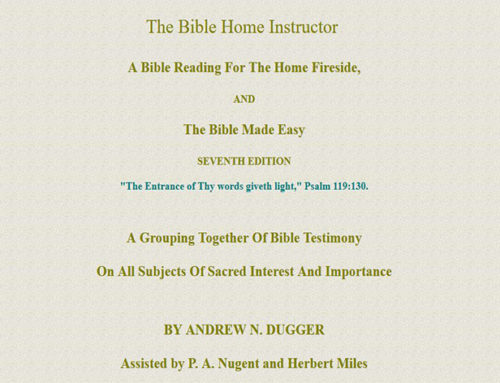1. To whom were the promises made?
“Now to Abraham and his seed were the promises made,” Galatians 3:16.
2. What was the promise referred to here that was given to Abraham and his seed?
“And the Lord said unto Abram after that Lot was separated from him, Lift up now thine eyes, and look from the place where thou art northward, and southward, and eastward, and westward: for all the land which thou seest, to thee will I give it, and to thy seed for ever,” Genesis 13:14, 15.
3. Did God renew and repeat this promise to Abraham’s son Isaac?
“Sojourn in this land, and I will be with thee, and will bless thee; for unto thee, and unto thy seed, I will give all these countries, and I will perform the oath which I sware unto Abraham thy father,” Genesis 26:3.
4. Was this promise of a land inheritance renewed and declared to Isaac’s son Jacob?
“I am the Lord God of Abraham thy father, and the God of Isaac: the land whereon thou liest, to thee will I give it, and to thy seed; And thy seed shall be as the dust of the earth, and thou shalt spread abroad to the west, and to the east, and to the north, and to the south; and in thee and in thy seed shall all the families of the earth be blessed,” Genesis 28:13, 14.
5. Under this promise how long were the fathers and their seed to possess the land?
“And I will give unto thee, and to thy seed after thee, the land wherein thou art a stranger, all the land of Canaan, for an everlasting possession,” Genesis 17:8.
6. What were the exact boundary lines of the promise to Abram and his seed?
“In the same day the Lord made a covenant with Abram, saying, Unto thy seed have I given this land, from the river of Egypt unto the great river, the river Euphrates,” Genesis 15:18.
7. According to the New Testament were these promises fulfilled and realized by Abraham, Isaac and Jacob and their seed to possess the land?
“And he said, Men, brethren and fathers, hearken; the God of glory appeared unto our father Abraham, when he was in Mesopotamia, before he dwelt in Charran, and said unto him, Get thee out of thy country, and from thy kindred, and come into the land which I shall shew thee. Then came he out of the land of the Chaldeans, and dwelt in Charran: and from thence, when his father was dead, he removed him into this land, wherein ye now dwell. And He gave him none inheritance in it, no, not so much as to set his foot on: yet he promised that He would give it to him for a possession, and to his seed after him, when as yet he had no child,” Acts 7:2-5.
8. Did Abraham expect to receive the fulfillment of the promise during his natural lifetime, or did he look to the future?
“By faith Abraham, when he was called to go out into a place which he should after receive for an inheritance, obeyed; and he went out, not knowing whither he went. By faith he sojourned in the land of promise, as in a strange country, dwelling in tabernacles with Isaac and Jacob, the heirs with him of the same promise. These all died in faith, not having received the promises, but having seen them afar off,” Hebrews 11:8, 9, 13.
9. For what reason did the apostle Paul stand in judgment before King Agrippa?
“And now I stand and am judged for the hope of the promise made of God unto our fathers: unto which promise our twelve tribes, instantly serving God day and night, hope to come. For which hope’s sake, king Agrippa, I am accused of the Jews,” Acts 26:6, 7.
10. What is said of the importance and nature of these promises?
“Whereby are given unto us exceeding great and precious promises: that by these ye might be partakers of the divine nature,” II Peter 1:4.
11. What does Paul say of the promises made to Abraham regarding their territorial dominion?
“For the promise, that he should be the heir of the world, was not to Abraham, or to his seed through the law, but through the righteousness of faith,” Romans 4:13.
12. To whom does the statement “to thy seed,” refer which is so often mentioned in the promise to Abraham?
“Now to Abraham and his seed were the promises made. He saith not, And to seeds, as of many; but as of one, And to thy seed, which is Christ,” Galatians 3:16.
13. Do the benefits of this promised inheritance to Abraham extend only to his literal descendants, or will Gentiles of every race and nationality likewise share as heirs of this promised inheritance?
“For as many of you as have been baptized into Christ have put on Christ. There is neither Jew nor Greek, there is neither bond nor free, there is neither male nor female: for ye are all one in Christ Jesus. And if ye be Christ’s, then are ye Abraham’s seed, and heirs according to the promise,” Galatians 3:27, 28, 29.



Leave A Comment